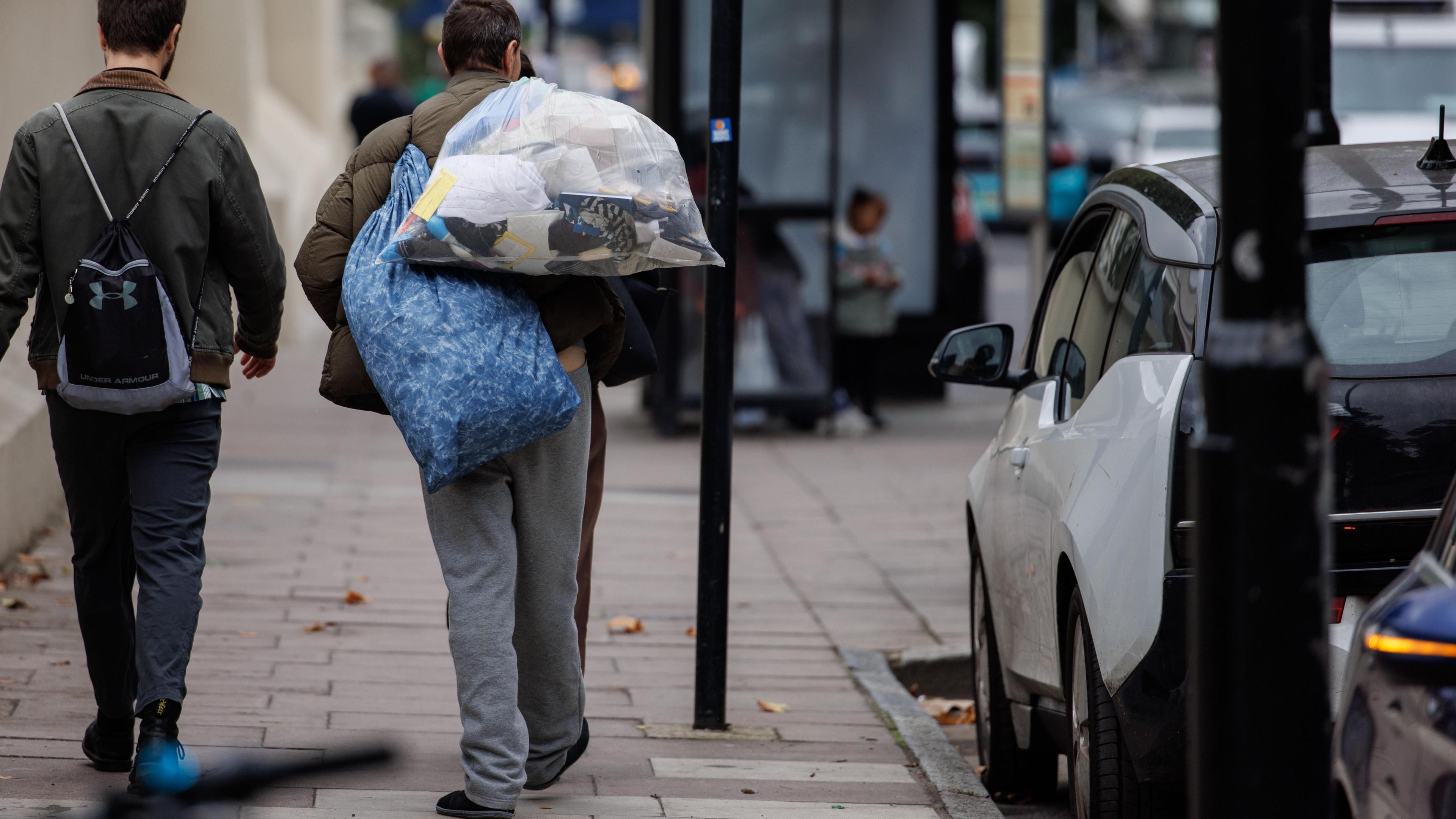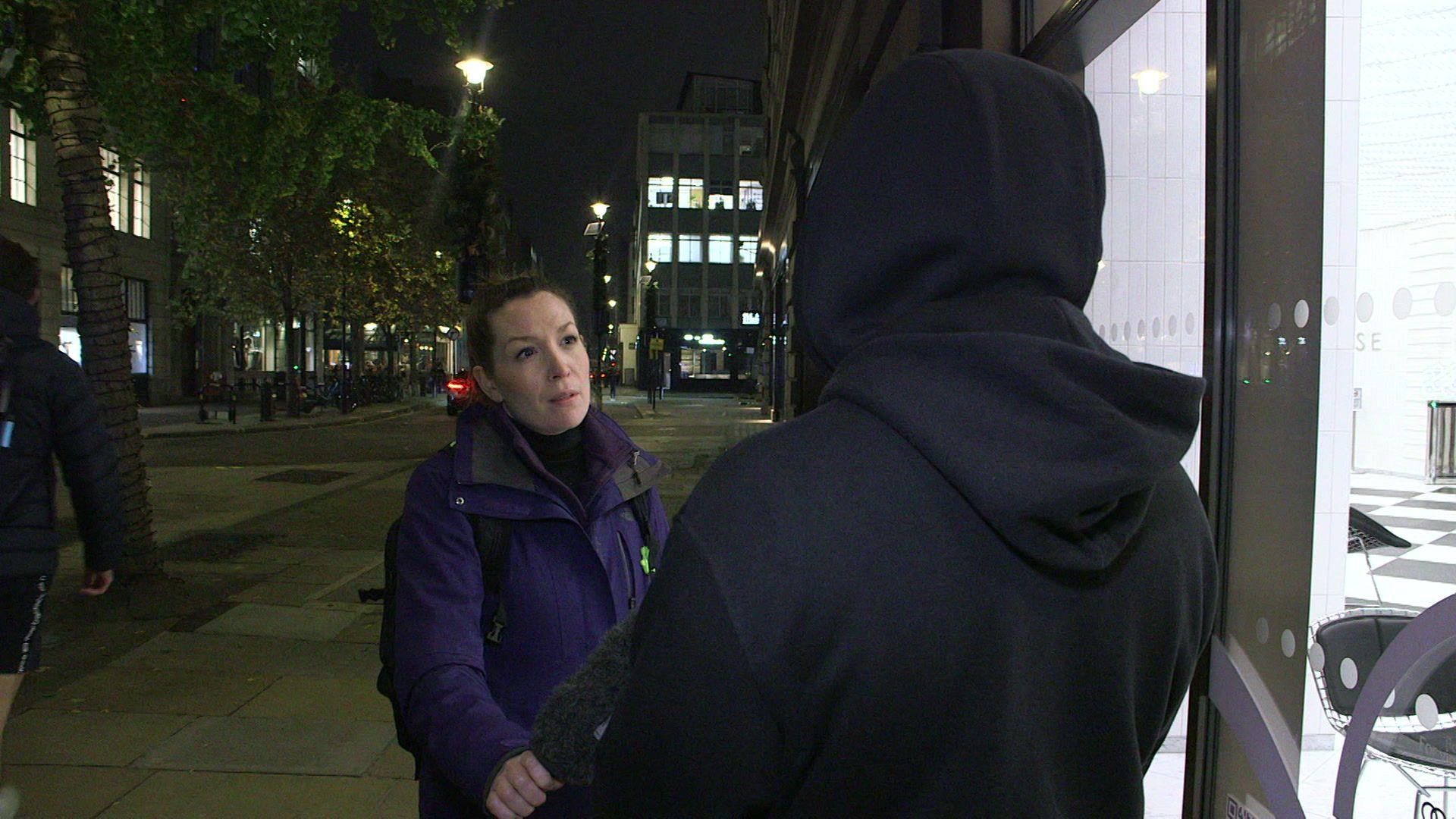Early prison release: 'I'm lost and don't know what to do'

Some prisoners have been released early to alleviate overcrowding
- Published
“We weren’t given much notice when we were leaving,” says ex-prisoner Jason. "Now, I'm lost. I don't actually know what to do."
He walks across London to meet us but he has no money for a bus. He says he has a travel ticket given to him when leaving prison, but bus drivers don’t often accept them.
“They don't know what they are, even when I explain. They don't let me onboard,” he says.
It happened again, but Jason, which is not his real name, is keen to tell us his story and explain why he has gone from sleeping in a prison cell to living on the streets after his early release.
Jason was jailed for nearly four years for driving offences but he was let out eight months early as part of the government's early release scheme to deal with overcrowding and poor conditions.
“Usually you go through management but we didn't have a chance to even find a hostel,” he says.
He gave a relative's address, even though he knew they didn't have room for him.
When asked if he wishes he had been released early, he simply replies: “No.”
“There was a structure inside. You knew when you were going to eat.
"It's hard for people like me.”

Jason (not his real name) tells BBC London he spends some nights sleeping on the capital's busiest streets
He believes offenders who want to rebuild their lives and give back should be offered suitable housing.
The ex-offender is one of nearly 3,000 people who were let out early in England and Wales. Around 10% if those were in the capital.
How many people are in prison and who is being released early from jail?
- Published11 December 2024
Early release: 'We need support when we get out'
- Published1 November 2024
Why Starmer hired key-cutting boss as prisons minister
- Published6 July 2024
He meets up with Veral Paul-Walcott, a community activist who leads the cycling group c86erz, which brings supplies to London's rough sleepers by bike.
Mr Paul-Walcott is helping increasing numbers of former prisoners who are rough sleeping. He believes the government has just pushed the most vulnerable from prisons to the streets.
“They need to look at these initiatives and basically make sure that they work 360," he says.
"This whole situation of dealing with one part of problem but not dealing with the support mechanism afterwards doesn’t make any sense to me.”
He has seen former prisoners relapse and reoffend on the streets due to a lack of support.
This is echoed by Mikkel Juel Iversen, founder of homeless charity Under One Sky, who says there has been a "breakdown of care towards prisoners".
"Without a plan in place on release they are set up to fail in multiple ways," he says.
"Any rehabilitation progress made is likely to be lost with homelessness only adding to their trauma."
About a quarter of inmates re-offend after being released from prison and the most common crime is theft.
'We have enough places'
James Timpson is the minister in charge of England and Wales' prisons and probation services.
Before his appointment to the House of Lords after Labour's election win, he was best known as a the high street boss who employed ex-offenders across his more than 1,000 Timpson stores.
When asked about experiences faced by people like Jason, he insists "we have enough places for people to go into when they leave prison".

Lord Timpson was put in charge of prisons in July
"A lot of these people live very chaotic lives, and they aren't staying in the accommodation that's been provided," Lord Timpson tells BBC London.
"I met a man on probation [and] he was banned from every hostel. So what do we do with people like that?"
He adds: "If they don't have somewhere to stay, they will reoffend, and that is the ongoing cycle we've got to stop."
Lord Timpson is speaking at the opening a new kitchen training facility for current and former prisoners in south-east London in his first media interview since joining the government.
He says he "never dreamt" of becoming prisons minister after his work with prisoners over the last 20 years.
He adds that he is hoping to use the experience of running a large business to turn things around in prisons and probation.
One scheme he is examining is an incentive model which awards credits for good behaviour in prison to encourage rehabilitation and prepare inmates for successful reintegration into society.
Listen to the best of BBC Radio London on Sounds and follow BBC London on Facebook, external, X, external and Instagram, external. Send your story ideas to hello.bbclondon@bbc.co.uk, external